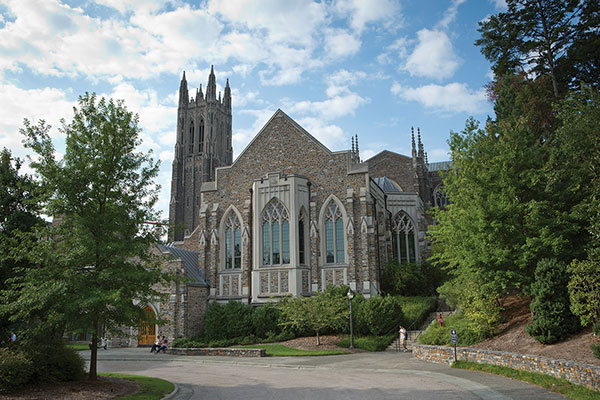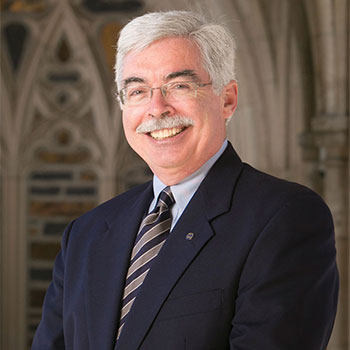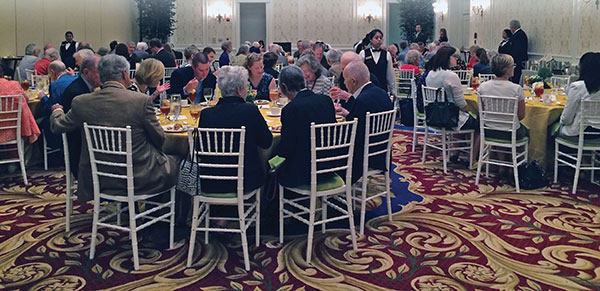 |
Duke Divinity School
Credit: Duke Photography |
Many theological schools struggle to raise enough funds to end the fiscal year in the black. Why then should their advancement teams — often understaffed and overworked — also create and implement planned-giving programs that may not benefit the bottom line for decades?
In Trust publisher Jay Blossom recently spoke with Wesley F. Brown, associate dean for leadership giving at Duke Divinity School, to learn the answer.
Q You’ve been involved in all aspects of development work since 1981. From your experience, should fundraisers spend the bulk of their time generating immediate gifts or cultivating long-term bequests?
 |
|
Wesley F. Brown is associate dean for leadership giving at Duke Divinity School, where he has been on the development staff since 1981. He is an ordained United Methodist Minister.
Credit: Duke Photography
|
A Both kinds of gifts are essential. Alumni just out of school and new to ministry usually have loans to repay and aren’t thinking about planned giving. On the other hand, graduates who retired after long and satisfying careers are making end-of-life decisions about their resources. The idea might not have occurred to them that an estate gift could benefit an institution that made a huge difference in their lives.
This is why communications about planned-giving opportunities need to be steady and patient. At some point this will make sense to the recipients of the information.
Q Should a school first reach out to non-alumni? Or are alumni the low-hanging fruit even though they may have fewer resources?
A Focus first on graduates. Many have a desire to say “thank you” to the school that shaped their practices and affirmed their call to ministry. In more cases than not, the school provided financial aid that helped make ends meet. It can be very rewarding for an alumnus to help a current student get through a degree program with less debt.
The next tier of potential donors is the non-alumni who have had some connection to the school through a beloved pastor. Maybe they’ve served on a committee or a board. Most schools will tell you that donors with the greatest impact are not necessarily their graduates but people whom their graduates have influenced.
Q Large institutions like Duke have sophisticated ways to research prospects. How can schools with limited resources identify likely donors?
A My advice is to pay attention to persons who have a connection with the school and who give regularly. It doesn’t matter if it’s $5 a month or $100 a year; anyone who is faithful in giving is telling you that this institution means a lot to them. That opens the door to ask, “Have you thought about making it possible for your annual gift to be perpetual?” Or “Is there something that you would like to make happen through your estate plan?” Or “Have you considered the impact that your life and your philanthropy might have?”
A number of situations cause persons to respond to these questions with greater interest. For example, older people who are concerned about having enough money during their retirement might consider a charitable gift annuity that will give them a guaranteed income and eventually will enable them to create a named scholarship or support a meaningful program.
Q How do you initiate a discussion about estate plans?
A You have to ask people what’s most important to them. Do they have an interest in making an impact beyond their own life? Certainly, children, grandchildren, and great-grandchildren come first. Next come the institutions that have made a big difference in our lives, whether it’s a college or divinity school or public library or hospital. Those are the recipients that gifts and bequests often support. The good thing about planned giving is that once an institution is in an estate plan, it tends to remain. Donors typically don’t revisit a will and delete a recipient.
Q Church people tend to make sense of their finances based on Scripture and their discernment of God’s will. In light of that, do you use a theological frame in your conversations with donors?
A It is good to be reminded that there’s a practical side to what Jesus tells us about stewardship and about those things that stand between us and a stronger relationship with God. How can we be faithful in the use of the resources that are entrusted to us? The Gospels and Epistles have a lot to say about that.
But here’s the interesting thing: Fewer than half of people under age 35 have a will. You would think the inevitability of death and the necessity of providing for loved ones would persuade people to take care of such matters. We often fear death and hesitate to acknowledge that we have a responsibility beyond ourselves to make sure that the resources we’ve accumulated are put to the right use.
Q If a school has a small development staff, do you recommend outsourcing some of the planned-giving duties?
A A good program happens in a couple of ways. First, the in-house staff can systematically send potential donors ongoing reminders of planned giving that might take the form of brief testimonials or compelling examples. A second option is hiring a company to do planned-giving mailings that have the name of your school, the logo, and your contact information on them. The outside company — and there are many good ones — may encourage you to give them stories or photos of donors so they can include them in the mailings. That way, the message is more personal.
At Duke we generate two print communications a year. These share stories, perhaps a letter from a donor (with their permission) who has made a charitable gift or a simple illustration of how charitable giving makes sense. Along with the letter is a reply envelope: “I would like to know more about…” with a check-off box that says, “I have remembered the school in my will.” That’s really important. Then, about 10 days after that mailing goes out, I send an email that is simple and straightforward. It says, “I hope you saw the recent note from John and Mary Smith about their experience with planned giving. Please let me know how I can help you.” It’s remarkable how many people reply to let us know they want more information.
Q Why is the check-off box so important?
A It serves as a reminder and a prompt. It reminds the letter’s recipient that there are more ways to give than writing a check, putting it in the envelope, and sending it back. Marking “I have remembered the school…” opens a new conversation and a deeper relationship. It is the beginning of stories to be celebrated and shared.
Q Do you ever learn about donors whom you’ve never talked with and yet they’ve included the school in their estate plans?
A Yes, and when that happens I immediately get in touch with them to say thanks and ask if they would like to be a part of the Heritage Society at Duke University. If they say yes, we send them a framed membership certificate, a lapel pin, and an invitation to an annual luncheon (pictured below). In our annual report we list members of the Heritage Society and a brief note explaining that these are individuals who are remembering the divinity school in their estate plans. If they’re alumni, we always add their class year because it’s impressive when someone just ten years out includes us in their will.
The longer the donor list, the better. People see names they recognize and say, “I could do that too.” It starts the conversation and gives us an opportunity to follow up.
Q When someone decides to include the school in an estate plan, do you ask for details about the size and intent of the gift?
A I send a form that invites donors to tell us more about their bequest, the purpose, and the projected amount. The document reassures them that this is not binding on their estate; it’s simply a matter of sharing information that is useful to
the school as it anticipates the future.
The responses we get run the gamut. Sometimes donors are very specific as to whether the gift will be a life insurance policy that they signed over to us, their IRA money, appreciated stocks, bonds, etc. Other times it’s as simple as a donor saying, “If everybody else in my family dies, then the divinity school is going to get 10 percent of what’s left.” We certainly don’t require a particular level of giving or particular language of intention. We merely take the word of donors that we’re in their estate plans.
Q Is it helpful for a seminary to have an estate-planning lawyer on its board?
A It’s important to have access to someone who works in estate planning, although that person doesn’t have to be an attorney or a board member.
Here’s what you need to remember: Whenever you speak with a potential donor about estate planning, wills, and charitable gifts, you need to know what you’re talking about. These are complicated issues, and you must never communicate in any way, shape, or form that would be harmful to the donor or the institution. You never want a donor to say, “They talked me into doing something I shouldn’t have done.”
Q Does a seminary’s development office serve the school or the donor? Who benefits?
A Both. It is a great privilege to help someone to support an institution that means a lot to them. Ultimately it’s not about how many commas or zeroes that are in the gift; it’s about the act of giving.
Our vocation as a development officer is important, particularly if we believe deeply in the institution that we represent. Making sure people know the variety of ways they can participate, and then sharing stories about the impact that a gift is going to make — that’s a good thing. The gift itself may be something that we won’t see for 20 or 30 or 40 years, but it’s essential for the institution to know what’s in the pipeline that is going to make a difference. Our job as a development staff not only is to generate support, but also to be faithful stewards of philanthropy.
 |
Members of Duke Divinity School's Heritage Society are invited to an annual luncheon, shown here.
Credit: Alyssa Alegre |